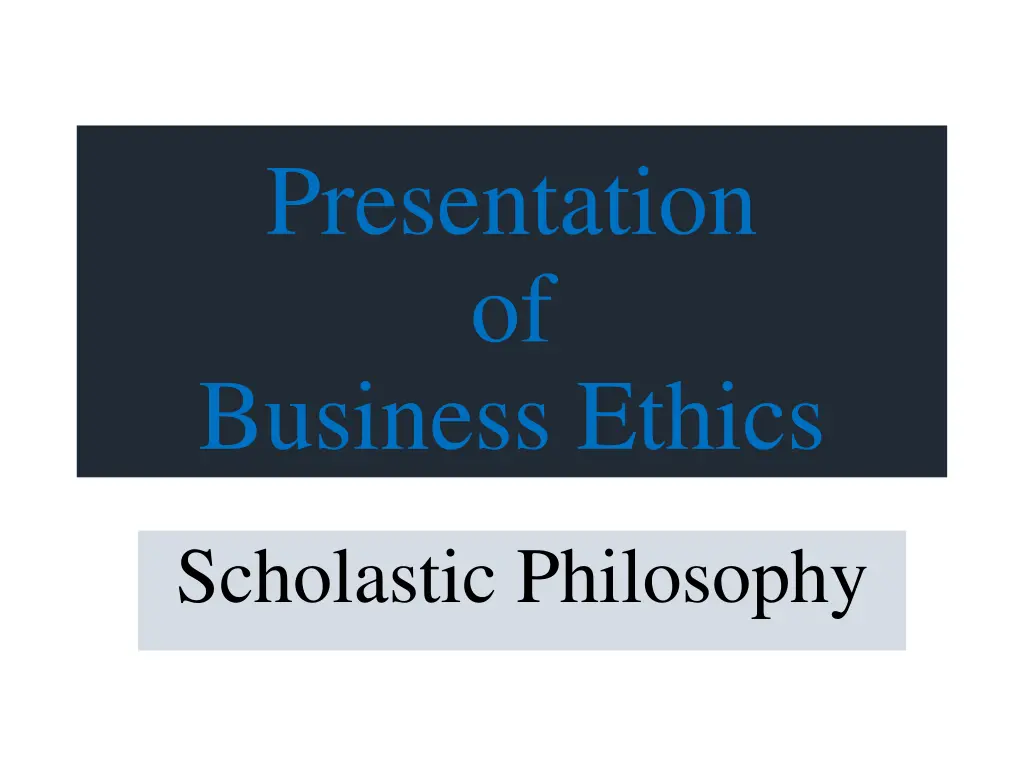
Understanding Scholastic Philosophy and Ethics
Explore the rich history and principles of Scholasticism, a philosophical method rooted in rigorous analysis and influenced by Aristotle and Neoplatonism. Discover how Scholastic Ethics revolves around spiritualism and the pillars of God's existence, creation, man's image, virtue, and happiness. Delve into the profound insights of renowned figures in Scholasticism and their quest for deeper philosophical answers.
Download Presentation

Please find below an Image/Link to download the presentation.
The content on the website is provided AS IS for your information and personal use only. It may not be sold, licensed, or shared on other websites without obtaining consent from the author. If you encounter any issues during the download, it is possible that the publisher has removed the file from their server.
You are allowed to download the files provided on this website for personal or commercial use, subject to the condition that they are used lawfully. All files are the property of their respective owners.
The content on the website is provided AS IS for your information and personal use only. It may not be sold, licensed, or shared on other websites without obtaining consent from the author.
E N D
Presentation Transcript
Presentation of Business Ethics Scholastic Philosophy
Scholastic Philosophy Scholasticism is a philosophical method used to evaluate, analyze, and criticize a dominant philosophical doctrine to come up with a new and more profound philosophical answer to the pervading questions. Scholasticism is based on dialectic method, Scholasticism is based on platonic philosophy. Socratic Discussion is the base of Scholasticism.
Development of Scholasticism Scholasticism (Early Renaissance to Enlightenment) Dark Age (Religious Superstitions) Ancient Period Modern Period Scholasticism (Early Renaissance to Enlightenment) Scholasticism is derived from the Latin word schola which means school. The concept of scholastic philosophy emerged from a group of philosophers detached from the whimsical religious ideologies and baseless teachings and assumptions by Pope.
Contd Scholastic thought is also known for rigorous conceptual analysis and the careful drawing of distinctions. It is based on the philosophy of Aristotle and Neoplatonism. The present day ancient universities of Europe namely England, France, Italy, and Spain were established . Major figures of scholasticism includes: Anselm of Canterbury, Alexander of Hales, and so on.
Scholastic Ethics Scholastic Ethics is based on Nicomachean Ethics and the Politics of Aristotle. Scholastic ethics refers to the ethics of schoolmen in general term. Scholastic Ethics is inclined towards Spiritualism.
Pillars of Scholastic Ethics 1. The Existence of God 2. The History of Creation 3. Man as a image of God 4. Virtue and Happiness
The Existence of God There is existence of god, All the fundamental rules and the way of conducting life are imposed by the supreme authority, the creator or the God. A man who breaks the law is punished naturally making him unfit for rational happiness. Based on both ethical consideration and theological consideration.
The Existence of God To do right conscientiously and systematically is to build up habits of virtue; it is to form to oneself a character of goodness; it is to become naturally a fit subject for happiness.
The History of Creation History of creation is associated with reality. God is the supreme being so he neither has beginning nor ending, Every effect necessarily has a sufficient reason or cause for its existence. For example: The emergence of global warming is the effect, and its causes are stored in history.
Man as the image of God St. Thomas wrote: Man is made to God s image, and since this implies, so Damascene tells us, that he is intelligent and free to judge and master of himself, so then, now that we have agreed that God is the exemplar cause of things and that they issue from his power through his will, we go on to look at this image, that is to say, at man as the source of actions which are his own and fall under his responsibility and control.
Man as the image of God God is not only the efficient cause of man, but also his exemplar cause, Man by the way of intelligence, freedom, and mastery, are all rooted in his being an image of God. An ethical life can only be a life in conformity with the life of God. In Hinduism, Perfectly Ethical Person is compared with Lord Ram.
Virtue and Happiness Virtue refers to moral excellence. (Republic (380 BC.), Plato) Socrates has defined Happiness as the ultimate goal of life. Human intellect guides the will towards the Good , who is god himself. Man follow the path of being good, and must be example of his being.
Virtue and Happiness Man is said to lie in between divinity and brutishness or rationality and animalism. Since it is only the intellect that knows what is truly good from what is only apparent, it must guide instinctual passions and appetites toward what is truly good. -Summa Theologica
According to Scholastics, the right habitual use of practical reason creates moral virtues; and the habitual practice of contemplation, of course functioning in accordance excellence, is the highest form of intellectual virtue. Through these achieve eudaimonia or happiness. with its proper virtues one can
Scholastic Philosophy Religion has great influence over scholastic ethics. God is the supreme being and one who violates the law is actually disobeying god. God is the creator of man and settles in every man in disguised form. An ethical life is a life in conformity with the life of God. Human intellect guides him or her towards good, the god himself
Even if you suffer injustice, never do injustice because when you suffer injustice your soul is not suffered, but when you do injustice, your soul will be in pain. Platonism (Edited)
ANY QUERIES!!! THANK YOU!!! 17
